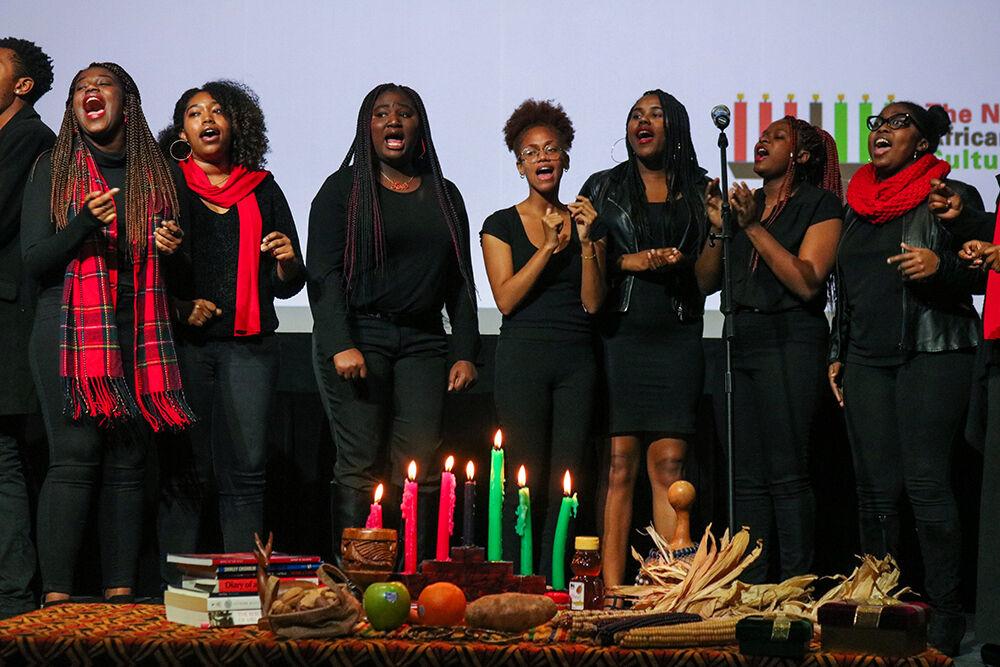As we approach the end of the year, we look forward to the many celebrations that winter brings. Among those celebrations is Kwanzaa, a Pan-African cultural celebration that was created by Maulana Karenga, a professor of Africana studies at California State University, Long Beach, in the 1960s after Karenga lived through the Watts Riots in California. Karenga traveled around the United States to spread his idea of Kwanzaa as a celebration of community and strength for African Americans.
The nascent celebration entered mainstream culture due to public schools and universities marking and institutionalizing the event. Kwesi Brookins, associate professor of psychology and Africana studies at NC State, discussed this symbiotic relationship and how the Black studies movement popularized Kwanzaa.
“Africana studies is part of what was the Black studies movement,” Brookins said. “Kwanzaa is part of that Black studies movement as well. Maulana Karenga is a prominent figure, a professor and a scholar, in the Black studies movement that also extends from the 1960s. Africana studies at North Carolina State University has an official major and minor degree and was founded in 2006.”
The African American Cultural Center (AACC) celebrates Kwanzaa every year with events, celebrations and traditional Kwanzaa customs, like lighting the seven candles and reciting the seven principles of Kwanzaa. This year, the AACC has had to move the Kwanzaa celebration online due to COVID-19 regulations. Despite this, the AACC has found online ways to still mark and celebrate Kwanzaa virtually. Aminat Bashorun, a graduate research assistant at the AACC, discussed the events marking each day of Kwanzaa.
According to Bashorun, the AACC is hosting events that celebrate some of the seven principles of Kwanzaa. Some of the events that have already occurred were a watch party and discussion of Beyoncé’s “Black is King” to celebrate kujichagulia, or self-determination; an Instagram Live interview with local Black businesses and Black entrepreneurs to celebrate ujamaa, or cooperative economics; and a storytelling and coffee hour to celebrate kumbaa, or creativity.
There are two more upcoming celebrations that students can participate in, according to Bashorun. The first is a reflection and healing space to celebrate imani, or faith. This event will be held Thursday, Nov. 12, from 12 – 2 p.m. and is in partnership with NC State Prevention Services and the Counseling Center.
“We’re using this time to show people how to heal, how to lead with grace and, you know, how to really, really own our Blackness, but at the same time, holding ourselves accountable as Black people,” Bashorun said.
The final event is the annual Kwanzaa ceremony, which will be held Friday, Nov. 13, from 6 – 8:30 p.m. The ceremony will encourage community and “uplift Black joy and purpose” while celebrating Nguzo Saba, or the seven principles of Kwanzaa.
Bashuron reflected on last year’s Kwanzaa celebration and said there was a sense of community that was built in Witherspoon Student Center. The AACC hopes this sense of community can still be translated across a virtual event.
“We would have dance performances,” Bashuron said. “We would have performances by the Uninhibited Praise choir. We would have spoken words, and students would come and tell their stories or share their poems. Then we would acknowledge Black faculty, Black staff and Black students, and we would recite the principles of Kwanzaa by lighting each different candle.”
Brookins said this year could see more widespread or renewed attention on Kwanzaa, similar to that of Juneteenth, after everything the Black community has experienced this year.
“Juneteenth was a pivotal moment for African American history,” Brookins said. “When you think about the ‘full recognition’ of that liberatory moment, when emancipation occurred, one could envision, for instance, what we’ve gone through in 2020 as a pivotal moment, particularly related to racial justice and the dismantling of racism and the events that led up to that. Certainly it will depend on what happens after this moment, but I could easily see them revisiting [Kwanzaa] because of all of these significant things that occurred in this year and at this moment.”
Brookins said the University including celebrations like Kwanzaa and departments like Africana studies speaks to a growing desire for inclusivity on campus.
“The goal and the purpose is to make real this idea of diversity and inclusion,” Brookins said. “To be sure that the key experiences of a people in the United States, that indeed were pivotal or crucial and critical to the growth and development of the United States, would be included in the academic, scholarly curriculum of the University, right? That’s the big goal, right?”
For more information about the African American Cultural Center’s Kwanzaa celebration, visit the Center’s event page.



















